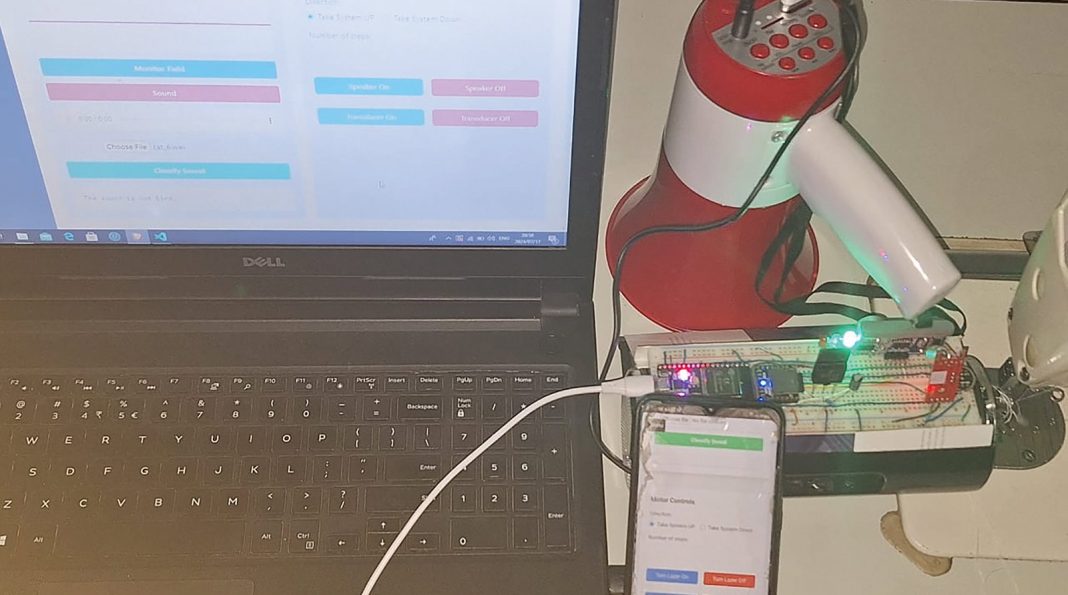A young innovator, Khotso Moholobela, has invented a bird repelling system in an effort to enhance crop production by effectively repelling birds, thereby improving food security and reducing dependency on food imports.
Dubbed AgrTek’s SmartAgro, the device offers an innovative, Artificial Intelligence (AI)-powered approach to bird repelling, that surpasses traditional methods.
By leveraging machine learning and Internet of Things (IoT) technologies, the system provides automated, adaptive, and highly effective bird repelling tailored to specific field conditions. This not only minimises the need for constant maintenance, but it also ensures a dynamic response to changing bird behaviours and environmental factors.
According to Moholobela, farmers can benefit a lot from this system as they cannot always be watching out for the birds or even chasing them away all day.
He says the system has been powered with machine learning to allow it to know which sounds to listen for and which ones to produce once the alarm is triggered.
The system listens to all sounds and then it is able to identify if a sound is from a bird or not through sound sensors. If the sound matches bird sounds, then the alarm is triggered and the system now has to release a sound through a loud speaker that will send the birds away.
In an interview with theReporter this week, Moholobela said the idea came about due to personal and community experiences with reduced crop yields caused by bird infestations. This is what motivated him to create a tech-driven solution to address the problem.
“Growing up in a farming family, I witnessed first-hand the significant impact bird infestations had on crop yields. The necessity to find a reliable solution for this widespread issue inspired the development of this innovative system.
“Utilising renewable energy through solar panels and requiring minimal upkeep, SmartAgro is both a cost-effective and sustainable solution, setting us apart from conventional methods employed by other companies,” he said.
The system’s target market includes small and medium farmers, as it offers affordable and scalable solution, and commercial farmers by providing comprehensive systems for large-scale operations. It also targets educational institutions, collaborating for research and development purposes.
This is the first complete system Moholobela has developed. However, he has been involved in projects such as proposing automated irrigation systems and AI-based crop health monitoring systems during various workshops and initiatives such as the UNDP Lesotho STEAMing2023 initiative.
Born and bred at Kolo Ha Mphaololi in the Mafeteng district, Moholobela is currently pursuing a Bachelor of Engineering in Computer Systems and Networks at the National University of Lesotho.
“Initially, I worked on this project alone. However, to expedite development I have begun collaborating with Liau Libetoe and Tokelo Makafane. We all hold Diplomas in Computer Systems and are currently pursuing degrees in Computer Systems and Networks Engineering at the National University of Lesotho (NUL),” he noted.
“The system is in the prototype phase and has undergone preliminary testing. The initial feedback has been positive, highlighting the system’s potential effectiveness,” he indicated.
Moholobela assured Basotho that the system has been rigorously tested in various conditions and continuously improved based on feedback.
“My commitment to ongoing research and development ensures that the system remains effective and reliable,” he pointed out.
Developing the system took him approximately six months from concept to prototype. Most materials and components were sourced from suppliers in South Africa due to the unavailability of specific items locally.
Data availability was one of the main challenges, as he did not have readily available data such as stored sounds of the animals. This forced him to physically go out and record as the animals made those sounds. Moholobela also sometimes uses sounds from the internet when he cannot find the required sounds outside.
Apart from that, financial constraints made it hard for him to purchase equipment, coupled with high costs associated with importing equipment from South Africa.
To overcome that, he used personal funds and support from family to finance the project. Additionally, he participated in various initiatives to gain exposure and resources.
In the next few years, the innovator envisions widespread adoption of this system across Lesotho, significantly improving crop yields and food security. He also aims to expand to other countries facing similar agricultural challenges.
“The bird repelling system represents a significant advancement in agricultural technology. It offers a sustainable solution to bird infestations, ensuring better crop yields and contributing to food security. I encourage Basotho to embrace and support this innovative approach,” he urged.
Individuals or businesses who would like to support or fund Moholobela can contact him on +266 6305 6214 or him an email: mkhotso835@gmail.com








